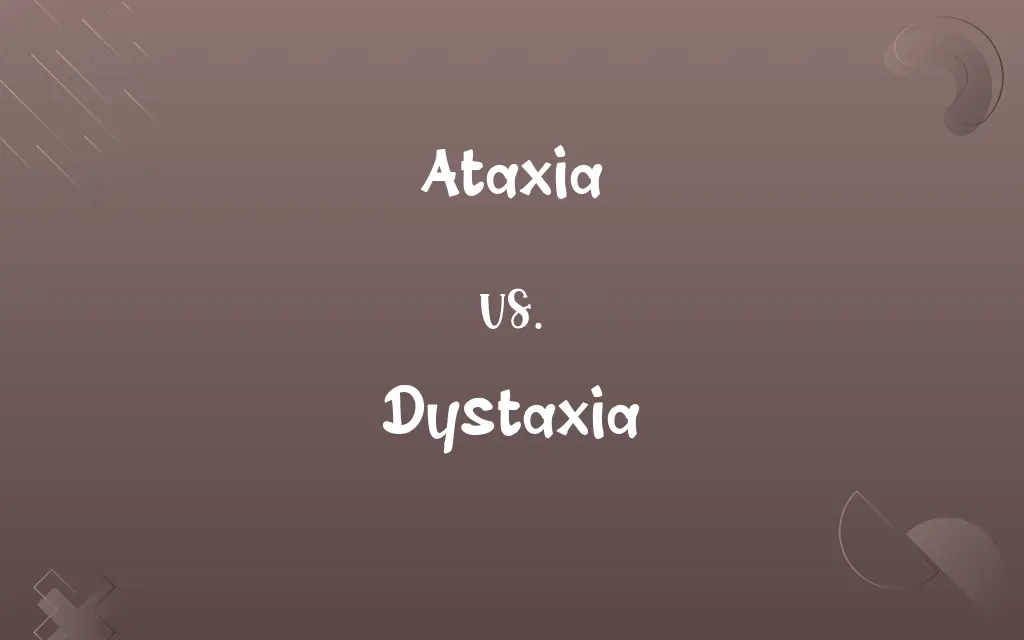Ataxia vs. Dystaxia: Know the Difference

By Shumaila Saeed || Updated on December 26, 2023
Ataxia is the lack of muscle coordination during voluntary movements. Dystaxia is a specific type of ataxia, often indicating a lesser degree of incoordination.

Key Differences
Ataxia refers to a neurological sign and symptom consisting of a lack of coordination of muscle movements. It encompasses various dysfunctions in voluntary motor activity, impacting balance, gait, speech, and eye movements. Dystaxia, on the other hand, is a term sometimes used to describe a specific form of ataxia, usually implying a less severe or more localized manifestation of incoordination.
Shumaila Saeed
Dec 26, 2023
Ataxia can be a result of various neurological disorders, genetic conditions, or injuries that affect the cerebellum or other parts of the nervous system. It is a broad term that covers a wide range of coordination problems. Dystaxia is often used in a more restricted sense, sometimes referring to milder forms of ataxia or specific disturbances in motor coordination.
Shumaila Saeed
Dec 26, 2023
In diagnosing ataxia, doctors look for symptoms like uncoordinated walk, poor hand-eye coordination, and difficulty in tasks requiring fine motor skills. Dystaxia is also diagnosed through similar symptoms but is often considered when these symptoms are less pronounced or restricted to a specific area of motor function.
Shumaila Saeed
Dec 26, 2023
Treatment for ataxia depends on its cause but often involves physical therapy, occupational therapy, and speech therapy. For dystaxia, the approach is similar, focusing on improving specific motor functions and compensating for coordination deficits.
Shumaila Saeed
Dec 26, 2023
The prognosis of ataxia varies widely depending on its cause and severity. It can range from a mild, non-progressive condition to a symptom of a severe, degenerative neurological disorder. In contrast, dystaxia often has a better prognosis, especially when it is an isolated symptom or part of a less severe condition.
Shumaila Saeed
Dec 26, 2023
ADVERTISEMENT
Comparison Chart
Definition
Lack of muscle coordination during voluntary movements.
A specific, often less severe, form of ataxia.
Shumaila Saeed
Dec 26, 2023
Underlying Causes
Broad, including genetic, degenerative, or injury-related.
Can be a subset of ataxia causes.
Shumaila Saeed
Dec 26, 2023
Diagnostic Criteria
Broad range of coordination issues.
Specific or milder coordination issues.
Shumaila Saeed
Dec 26, 2023
Treatment and Prognosis
Varies, often involves therapy; can be progressive.
Similar to ataxia but often with better prognosis.
Shumaila Saeed
Dec 26, 2023
ADVERTISEMENT
Ataxia and Dystaxia Definitions
Ataxia
Neurological sign characterized by lack of muscle control.
The patient's ataxia was evident in his unsteady gait.
Shumaila Saeed
Dec 26, 2023
Dystaxia
A milder or specific form of ataxia affecting coordination.
He suffered from dystaxia, making precise hand movements tough.
Shumaila Saeed
Dec 26, 2023
Ataxia
A condition affecting balance, speech, and coordination.
Ataxia affected his ability to play the piano.
Shumaila Saeed
Dec 26, 2023
Dystaxia
Less severe coordination disturbance.
Dystaxia caused her minor difficulties in handwriting.
Shumaila Saeed
Dec 26, 2023
Ataxia
A symptom of various neurological diseases affecting movement.
The neurologist diagnosed her dizziness and lack of coordination as ataxia.
Shumaila Saeed
Dec 26, 2023
ADVERTISEMENT
Dystaxia
A specific motor coordination impairment.
The child's dystaxia was most noticeable when he tried to tie his shoes.
Shumaila Saeed
Dec 26, 2023
Ataxia
Disorder causing difficulty in coordinating movements.
Ataxia made simple tasks like buttoning a shirt challenging.
Shumaila Saeed
Dec 26, 2023
Dystaxia
A condition with localized coordination problems.
Dystaxia affected her fine motor skills, particularly in her left hand.
Shumaila Saeed
Dec 26, 2023
Dystaxia
A term used for less pronounced ataxia symptoms.
His dystaxia was mild, only slightly impacting his balance.
Shumaila Saeed
Dec 26, 2023
Ataxia
Any of various degenerative, often hereditary, disorders that are characterized by ataxia and are frequently associated with cerebellar atrophy.
Shumaila Saeed
Oct 19, 2023
Ataxia
(pathology) Lack of coordination while performing voluntary movements, which may appear to be clumsiness, inaccuracy, or instability.
Shumaila Saeed
Oct 19, 2023
Ataxia
(chemistry) The condition of a polymer in which the orientation of the subunits is random
Shumaila Saeed
Oct 19, 2023
Ataxia
Loss of coordination in the voluntary muscles, especially the limbs; an inability to coordinate voluntary muscle movements; it results in unsteady movements and a staggering gait. See also locomotor ataxia, an ataxia which occurs when attempting to perform coordinated muscular movements.
Shumaila Saeed
Oct 19, 2023
Ataxia
Inability to coordinate voluntary muscle movements; unsteady movements and staggering gait
Shumaila Saeed
Oct 19, 2023
Ataxia
Impairment of voluntary coordination of muscle movements.
Her ataxia made walking without assistance difficult.
Shumaila Saeed
Dec 26, 2023
Repeatedly Asked Queries
Is dystaxia always less severe than ataxia?
Generally, dystaxia is considered a less severe or specific form of ataxia.
Shumaila Saeed
Dec 26, 2023
Can ataxia be cured?
Cure depends on the cause; some forms are treatable, while others are managed symptomatically.
Shumaila Saeed
Dec 26, 2023
How is ataxia diagnosed?
Diagnosis involves neurological exams, medical history, and sometimes genetic testing.
Shumaila Saeed
Dec 26, 2023
Are ataxia and dystaxia genetic?
Some forms can be genetic, but not all cases are hereditary.
Shumaila Saeed
Dec 26, 2023
Can ataxia affect speech?
Yes, it can cause dysarthria, affecting clarity of speech.
Shumaila Saeed
Dec 26, 2023
What is ataxia?
Ataxia is a lack of voluntary coordination of muscle movements, often due to neurological disorders.
Shumaila Saeed
Dec 26, 2023
What causes dystaxia?
Dystaxia is caused by similar factors as ataxia but usually represents a milder form.
Shumaila Saeed
Dec 26, 2023
What are common symptoms of dystaxia?
Symptoms include mild coordination problems, often in specific activities or limbs.
Shumaila Saeed
Dec 26, 2023
Are ataxia and dystaxia related to MS?
They can be symptoms of multiple sclerosis but are not exclusive to it.
Shumaila Saeed
Dec 26, 2023
What lifestyle changes help with ataxia?
Regular exercise, safety modifications at home, and occupational therapy can help.
Shumaila Saeed
Dec 26, 2023
Are there support groups for dystaxia?
Yes, support groups for ataxia and related disorders often include dystaxia.
Shumaila Saeed
Dec 26, 2023
Is physical therapy effective for ataxia?
Yes, it's often a key part of managing ataxia, improving mobility and independence.
Shumaila Saeed
Dec 26, 2023
Can children have ataxia or dystaxia?
Yes, both conditions can occur in children, sometimes due to congenital reasons.
Shumaila Saeed
Dec 26, 2023
Is ataxia a symptom of stroke?
It can be, as strokes can affect parts of the brain responsible for coordination.
Shumaila Saeed
Dec 26, 2023
How does dystaxia affect daily life?
It can make tasks requiring fine motor skills challenging but varies in severity.
Shumaila Saeed
Dec 26, 2023
Is research being done on ataxia and dystaxia?
Ongoing research aims to understand these conditions better and develop treatments.
Shumaila Saeed
Dec 26, 2023
Is dystaxia a standalone condition?
It can be part of a broader neurological condition or an isolated symptom.
Shumaila Saeed
Dec 26, 2023
Can ataxia lead to disability?
In severe cases, it can significantly impact daily functioning and independence.
Shumaila Saeed
Dec 26, 2023
Does dystaxia progress over time?
Its progression depends on the underlying cause; some forms may be stable.
Shumaila Saeed
Dec 26, 2023
Can medication treat dystaxia?
There's no specific medication for dystaxia; treatment focuses on symptom management.
Shumaila Saeed
Dec 26, 2023
Share this page
Link for your blog / website
HTML
Link to share via messenger
About Author
Written by
Shumaila SaeedShumaila Saeed, an expert content creator with 6 years of experience, specializes in distilling complex topics into easily digestible comparisons, shining a light on the nuances that both inform and educate readers with clarity and accuracy.









































































